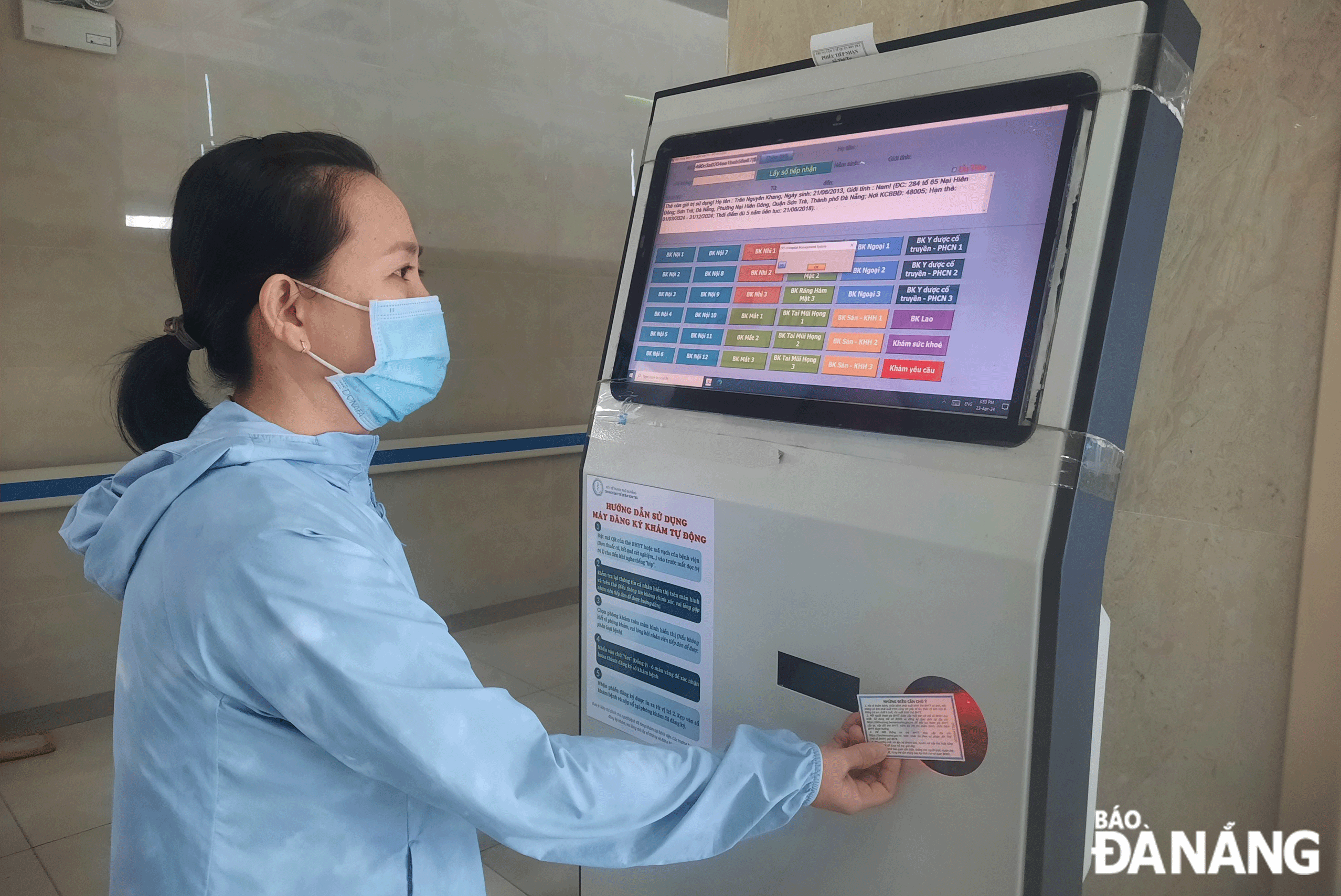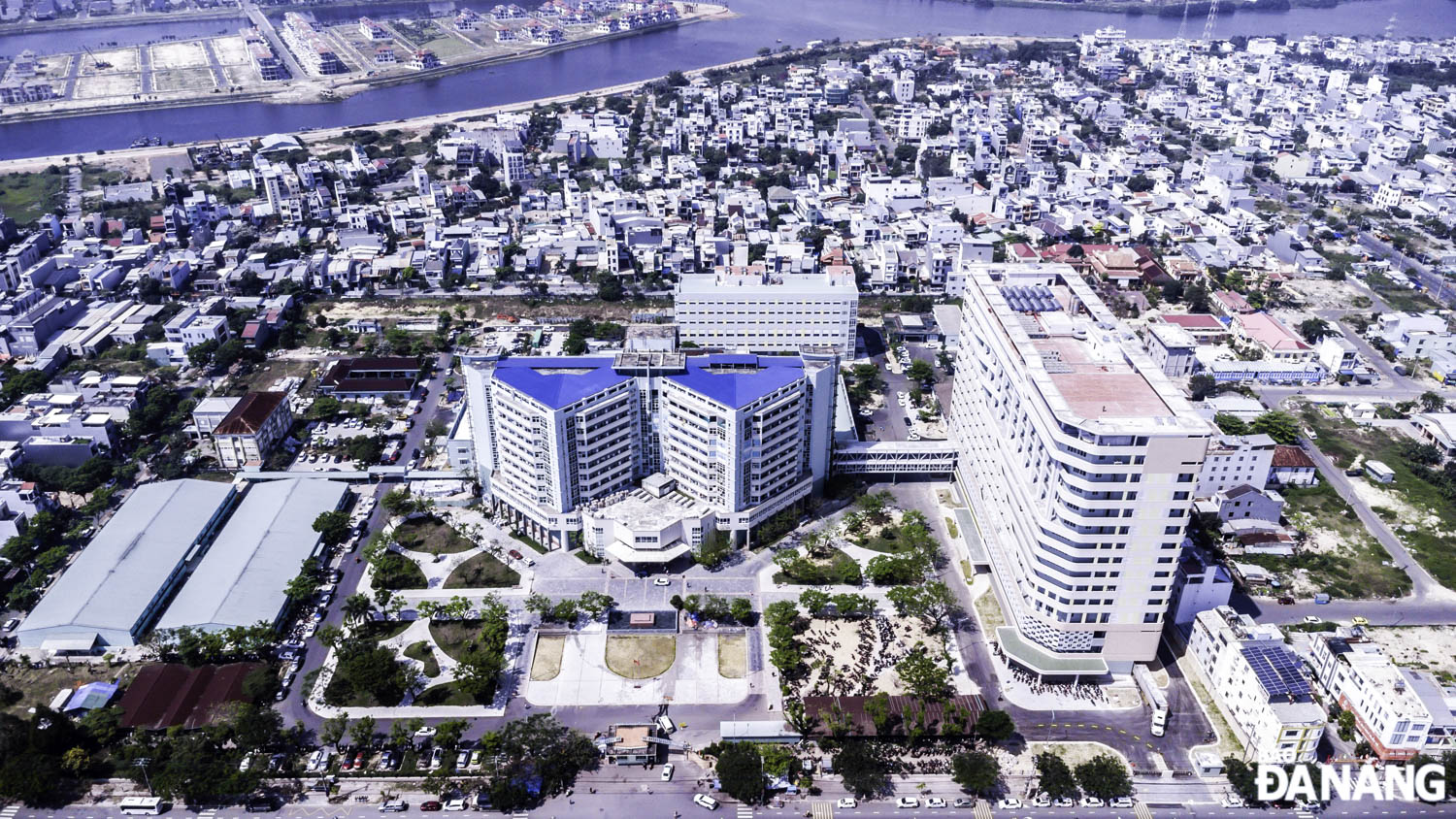Digital transformation facilitates people's access to medical services
E-medical records, cashless payment of hospital fees, QR Code scanning to register for medical examinations, and health examinations combined with changing driver's licenses are among digital transformation applications being deployed by hospitals across Da Nang, aimed at creating maximum convenience for people when accessing medical services.
 |
| People scan their health insurance cards to register for automatic examination through the automatic reception kiosk at the Son Tra District-based Medical Centre. Photo: H.N |
Convenient, fast access to medical services
Mr. Tran Nguyen Khang, a resident of Nai Hien Dong Ward, Son Tra District, was quite surprised at successfully registering for the medical examination at the district-based Medical Centre by only scanning the QR code instead of visiting the registration desk like before.
Director of the Son Tra District Medical Centre Ngo Van Dinh Hoai said that since 2017, the centre has proactively built a roadmap, and invested resources, to promote the application of information technology (IT) in all of its activities. The focus has been on training medical human resources with IT knowledge in order to improve the quality of medical examination and treatment services, and better serve the people.
The centre has also laid an emphasis on perfecting the hospital information software (HIS) system, and implementing the laboratory information system (LIS), the picture archiving and communication system (PACS) and the radiology information system (RIS).
Heed has been on integrating HIS, LIS, PACS/RIS systems in medical records; building electronic medical records (digitising medical data), and applying IT platforms to interact with patients.
According to Mr. Hoai, the centre has deployed medical examinations and treatment services by using chip-based citizen identification cards, or applying VssID and VNeID level 2 in a bid to replace paper health insurance cards.
At the same time, medical examination and treatment under health insurance cards through chip-based citizen identification cards have been deployed at the district’s Medical Centre and seven affiliated medical stations.
Moreover, the centre has upgraded the software to support medical examination reception using chip-based citizen identification cards at two automatic reception kiosks and the reception module in the hospital management platform HIS FPT e.Hospital.
Deploying automation of taking order numbers to register for examination at kiosks helps patients reduce procedures and waiting time, especially when registering for examination from the second time onwards.
After the Ngu Hanh Son District-based Medical Centre, the Son Tra District-based Medical Centre has also deployed support for level 4 online driver's license renewal integrated with driver health examination services.
People come for a general health check to meet the conditions to drive, and at the same time receive support in procedures for renewing a driver's license (if necessary) instead of having to go to the "One-Stop" shop at the municipal Department of Transport as before.
According to Director of the Da Nang Hospital Le Duc Nhan, the unit concentrates on building and developing e-hospitals, deploying e-invoice printing, upgrading e-medical record software, and registering for online medical examination in many forms.
The hospital also deploys medical examination and treatment for health insurance card holders using chip-based citizen identification cards or VNeID application to create maximum convenience for patients during their medical examination and treatment.
Digital transformation is an inevitable trend
According to Deputy Director of the municipal Department of Health Vo Thu Tung, the city's health sector has rolled out many solutions to boost IT application and digital transformation, and develop a smart hospital system in healthcare.
Recently, the city has issued the project "Smart medical development", including the goal that 100% of the city's medical facilities will apply an in-depth remote medical examination and treatment model with many specialties by 2025; and 100% of hospitals will not use paper medical records by 2030.
The intention of the project is to build and gradually form a smart disease prevention system, supporting people to easily access medical information.
By 2025, the city will implement the project "Developing smart healthcare in Da Nang" and form a smart healthcare system on all three main pillars including a smart disease prevention system; smart medical examination and treatment system; and smart medical management system. Accordingly, 100% of medical examination and treatment facilities will synchronise medical identification codes, and use personal identification codes from National population database to build medical IDs in citizen-related management software. Also, 100% of medical examination and treatment facilities will deploy applications to exploit electronic health records in medical examination and treatment.
Reporting by HAN NGUYEN - Translating by M.DUNG








